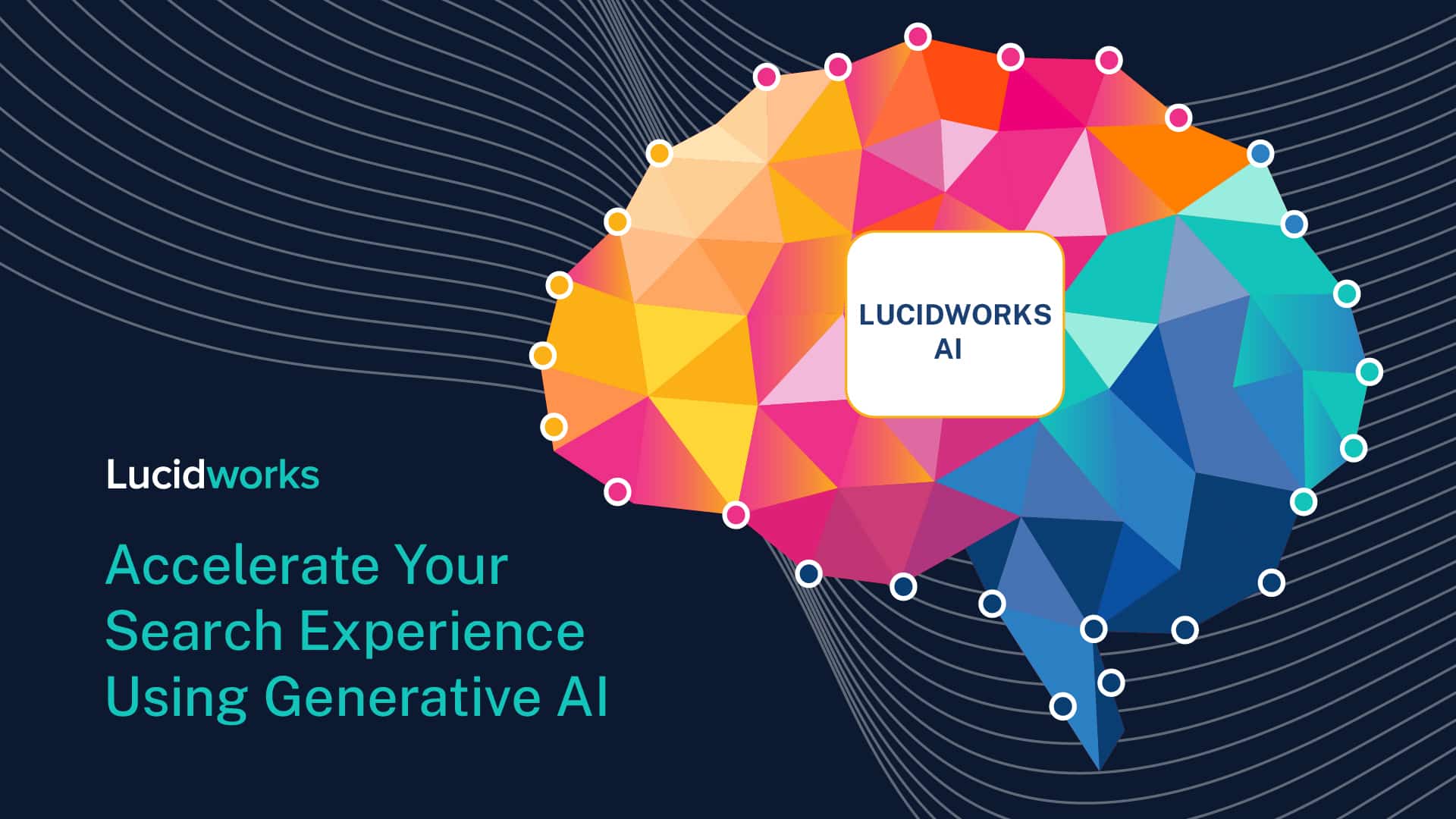Beyond Keywords: How AI Vector Search Transforms Your Search Experience
Discover how AI-powered vector search goes beyond simple keyword matching to deliver significantly more relevant and intuitive search results.

Article at a Glance:
- Vector Search Transforms How We Find Information: This technology goes beyond keywords, understanding context for more accurate and relevant search results.
- The Power of AI: Vector search uses AI algorithms to grasp the intent behind searches, delivering an experience that feels more human.
- Exciting Advancements at Lucidworks: Our platform blends AI and traditional search methods, ensuring your site search understands context just like users do.
Tired of irrelevant search results and endless scrolling? It’s a site search turn off for most consumers and employees. AI-powered vector search is transforming how we find information online, delivering more accurate and insightful results that go beyond simple keywords.
Vector search interprets the intent and context behind queries by using AI algorithms to offer unprecedented search accuracy. The industry — with Lucidworks at the forefront — is setting a new standard for website search capabilities by blending advanced AI with the nuances of human language understanding. This approach marks a pivotal shift in search technology’s role in our daily lives, revolutionizing how we find information and enhance user experiences across various digital platforms.

Understanding Vector Search
Vector search represents a cutting-edge approach in search technologies, employing AI to transcend the limitations of traditional keyword-based searches. Unlike conventional methods that rely on the exact match of keywords within documents, vector search understands the semantic meaning of queries.
Take this easy example: A shopper is looking for a new pair of running shoes. To start, they search for “blue running shoes.” With traditional keyword search, only shoes described as “blue” in their product listings will appear, missing out on relevant results like “navy running shoes”. With semantic vector search, the shopper will be exposed to shoes where the product is predominantly blue, even if the description doesn’t mention the color by name.

Basically, it understands that color variations fall within the user’s intent. This AI-powered technique converts words and phrases into vectors — numerical representations in a high-dimensional space — allowing the site search engine to grasp the context and underlying intent behind user queries.
The true power of vector search lies in its ability to understand and interpret the nuances of language, such as synonyms, related concepts, and the overall semantic meaning, which traditional search methods often overlook. For example, a search for “budget smartphones” might miss relevant results that use synonymous terms like “affordable mobile phones” in keyword-based systems. However, by analyzing the semantic relationships between terms, vector search can bridge this gap, delivering more comprehensive and contextually relevant results.
This approach fundamentally alters the site search landscape by prioritizing understanding over mere matching, enabling a more intuitive, efficient, and user-centric search experience. By leveraging AI to map queries and content within the same vector space, vector search ensures that the results are relevant to the specific words used and aligned with the searcher’s intent and expectations, setting a new benchmark for accuracy and relevance in digital search capabilities.

Lucidworks expertly harnesses this power with its cutting-edge platform, ensuring your site search understands context just like a human would.
The Power of Vectors in Search
Imagine walking into a vast library where each book represents a different word or concept. Now, visualize each book being assigned a unique coordinate, placing it at a specific location on an immense, multi-dimensional map. This map is akin to the vector space in vector search, and the process of assigning coordinates to words or concepts is essentially how vector search translates language into numerical representations or vectors.
To understand the transformation of words into vectors, consider the analogy of a group of friends at a party. Each friend has distinct characteristics — interests, personality traits, and background. In vector space, these characteristics can be represented numerically, allowing us to map each friend’s position relative to others. Friends with similar characteristics are closer, while those with less in common are further apart. Similarly, in vector search, words and concepts with similar meanings are represented by vectors closer in the vector space, facilitating the identification of semantically related content.

This spatial arrangement of vectors enables search algorithms to measure the “distance” between the query and potential site search results. The closer a document’s vector is to the query vector, the more relevant it will likely be. This methodology allows for a nuanced understanding of content, enabling the search engine to deliver results that are not only textually similar but also contextually aligned with the user’s intent.
By leveraging these numerical representations, vector search transcends the limitations of traditional website search methods, offering a more dynamic, intuitive, and accurate way to connect users with the information they seek. The power of vectors lies in their ability to capture the essence of language in a mathematical form, paving the way for a new era of search technology more aligned with human communication’s complexities and subtleties.
Vector Search vs. Keyword Search
Keyword search, the traditional mainstay of search engines, operates straightforwardly: it matches the exact words or phrases typed into the search bar with those found in documents or web pages. While effective for direct queries, this method often stumbles when faced with the nuances of human language. For instance, a search for “cold remedies” might overlook valuable content on “flu prevention” or “natural ways to fight a cold” simply because the exact terms do not match, leaving users with a narrower scope of information.

Enter vector search, an AI-driven paradigm that understands and values context, synonyms, and the interconnectedness of topics. Imagine someone searching for “heart-healthy foods.” Where a keyword search might strictly return results that contain the precise phrase, vector search dives deeper, recognizing related terms and concepts like “foods high in omega-3” or “antioxidant-rich fruits.” This capacity to interpret the intent behind a search allows vector search to cast a wider net, capturing a broader array of relevant and insightful results.
This fundamental difference highlights the evolution of search technology from a literal word-matching tool to an intelligent system that mirrors human understanding of language and context. By appreciating the subtleties and variations in how we express ideas, vector search not only overcomes the limitations of keyword search but also significantly enhances the user’s search experience with richer, more pertinent outcomes.
Real-World Applications of Vector Search
Vector search is transforming the digital landscape across multiple industries by enhancing the accuracy and relevance of site search results, thereby significantly improving user experiences and business outcomes. In e-commerce, this technology is a game-changer for product discovery. By understanding the nuanced intent behind customer queries, vector search can recommend products that match the search terms and align with the customer’s unexpressed desires.
For example, a customer searching for “gifts for outdoor enthusiasts” may receive recommendations for the obvious camping gear and less directly related items like waterproof Bluetooth speakers or eco-friendly travel accessories, thanks to vector search’s deep understanding of context and synonyms.

In customer support and knowledge bases, vector search streamlines information retrieval, making it easier for users to find solutions to their problems. Traditional keyword searches by a customer service agent or employee might return a flood of loosely related articles, requiring users to sift through them to find answers. Vector search, however, can directly pinpoint the most relevant articles based on the semantic meaning of the query, significantly reducing the time and effort spent by users in finding the right information.
Furthermore, vector search applications extend beyond e-commerce and customer support to industries like healthcare, where patients can find more accurate information on symptoms and treatments; and education, where students can discover learning materials that match their study needs. By delivering precisely what users are looking for, sometimes even before they can articulate it themselves, vector search enhances customer satisfaction and drives positive business outcomes through increased engagement and conversion rates.

How Lucidworks AI Enhances Vector Search
Lucidworks elevates vector search with its innovative hybrid search capability, merging the precision of lexical search with the contextual understanding of semantic search. This integration ensures users receive the most relevant results by combining traditional keyword matching with the nuanced interpretation of queries that vector search provides.
Neural Hybrid Search™ is at the core. This capability leverages embedding models to decode the meaning of text, translating it into vectors within a multidimensional space. This process allows for a deeper comprehension of content and queries, ensuring that site search results are accurate and contextually aligned with user intent.
Lucidworks AI further amplifies the power of vector search by offering access to a suite of pre-trained models alongside the flexibility to customize or develop new models tailored to specific business needs. This capability enables organizations to fine-tune their search functionality to their unique content and user search behaviors, improving site search experiences and outcomes.

Moreover, by hosting these models on Lucidworks AI, businesses benefit from optimized resource utilization, ensuring that website search services are efficient and scalable. This combination of advanced technology and customization options positions Lucidworks as a formidable tool in enhancing vector search capabilities, driving superior search experiences across various industries.
The Importance of Unified Search and AI Strategies
Integrating search and AI into a unified strategy is pivotal for businesses aiming to maximize the relevance and efficiency of their digital platforms. Lucidworks exemplifies this synergy through Neural Hybrid Search™, which effectively grounds generative AI responses within the specific context of a business’s unique data landscape. By embedding AI deeply into the site search process, Neural Hybrid Search™ ensures AI-generated content and recommendations are pertinent and highly tailored to the specific needs and behaviors of the target audience.

This approach enhances user satisfaction by delivering more meaningful and actionable results and reinforces the value of viewing search and AI as complementary forces. Together, they drive innovation and precision in how businesses connect users with the information or products they seek, ensuring that every search result is a step towards a more insightful and engaging user experience.
Discover the Future of Search with Lucidworks AI
As we navigate the complexities of digital information, the transformative potential of vector search becomes increasingly evident. This advanced search technology, especially when powered by Lucidworks AI, offers a pathway to deeper insights and meaningful connections with your content. Embrace the future of website search by exploring how vector search can revolutionize your organization’s search capabilities, making every query a journey toward precision and relevance.
Ready to elevate your search experiences to new heights? Learn how Lucidworks AI can seamlessly integrate vector search into your digital strategy, ensuring your organization stays at the forefront of innovation.
Best of the Month. Straight to Your Inbox!
Dive into the best content with our monthly Roundup Newsletter!
Each month, we handpick the top stories, insights, and updates to keep you in the know.